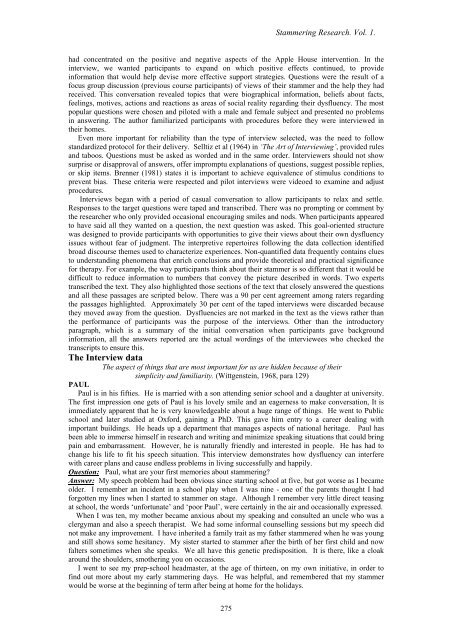Announcing 'Stammering Research' - Stammering Research - UCL
Announcing 'Stammering Research' - Stammering Research - UCL
Announcing 'Stammering Research' - Stammering Research - UCL
Create successful ePaper yourself
Turn your PDF publications into a flip-book with our unique Google optimized e-Paper software.
<strong>Stammering</strong> <strong>Research</strong>. Vol. 1.<br />
had concentrated on the positive and negative aspects of the Apple House intervention. In the<br />
interview, we wanted participants to expand on which positive effects continued, to provide<br />
information that would help devise more effective support strategies. Questions were the result of a<br />
focus group discussion (previous course participants) of views of their stammer and the help they had<br />
received. This conversation revealed topics that were biographical information, beliefs about facts,<br />
feelings, motives, actions and reactions as areas of social reality regarding their dysfluency. The most<br />
popular questions were chosen and piloted with a male and female subject and presented no problems<br />
in answering. The author familiarized participants with procedures before they were interviewed in<br />
their homes.<br />
Even more important for reliability than the type of interview selected, was the need to follow<br />
standardized protocol for their delivery. Selltiz et al (1964) in ‘The Art of Interviewing’, provided rules<br />
and taboos. Questions must be asked as worded and in the same order. Interviewers should not show<br />
surprise or disapproval of answers, offer impromptu explanations of questions, suggest possible replies,<br />
or skip items. Brenner (1981) states it is important to achieve equivalence of stimulus conditions to<br />
prevent bias. These criteria were respected and pilot interviews were videoed to examine and adjust<br />
procedures.<br />
Interviews began with a period of casual conversation to allow participants to relax and settle.<br />
Responses to the target questions were taped and transcribed. There was no prompting or comment by<br />
the researcher who only provided occasional encouraging smiles and nods. When participants appeared<br />
to have said all they wanted on a question, the next question was asked. This goal-oriented structure<br />
was designed to provide participants with opportunities to give their views about their own dysfluency<br />
issues without fear of judgment. The interpretive repertoires following the data collection identified<br />
broad discourse themes used to characterize experiences. Non-quantified data frequently contains clues<br />
to understanding phenomena that enrich conclusions and provide theoretical and practical significance<br />
for therapy. For example, the way participants think about their stammer is so different that it would be<br />
difficult to reduce information to numbers that convey the picture described in words. Two experts<br />
transcribed the text. They also highlighted those sections of the text that closely answered the questions<br />
and all these passages are scripted below. There was a 90 per cent agreement among raters regarding<br />
the passages highlighted. Approximately 30 per cent of the taped interviews were discarded because<br />
they moved away from the question. Dysfluencies are not marked in the text as the views rather than<br />
the performance of participants was the purpose of the interviews. Other than the introductory<br />
paragraph, which is a summary of the initial conversation when participants gave background<br />
information, all the answers reported are the actual wordings of the interviewees who checked the<br />
transcripts to ensure this.<br />
The Interview data<br />
The aspect of things that are most important for us are hidden because of their<br />
simplicity and familiarity. (Wittgenstein, 1968, para 129)<br />
PAUL<br />
Paul is in his fifties. He is married with a son attending senior school and a daughter at university.<br />
The first impression one gets of Paul is his lovely smile and an eagerness to make conversation, It is<br />
immediately apparent that he is very knowledgeable about a huge range of things. He went to Public<br />
school and later studied at Oxford, gaining a PhD. This gave him entry to a career dealing with<br />
important buildings. He heads up a department that manages aspects of national heritage. Paul has<br />
been able to immerse himself in research and writing and minimize speaking situations that could bring<br />
pain and embarrassment. However, he is naturally friendly and interested in people. He has had to<br />
change his life to fit his speech situation. This interview demonstrates how dysfluency can interfere<br />
with career plans and cause endless problems in living successfully and happily.<br />
Question: Paul, what are your first memories about stammering?<br />
Answer: My speech problem had been obvious since starting school at five, but got worse as I became<br />
older. I remember an incident in a school play when I was nine - one of the parents thought I had<br />
forgotten my lines when I started to stammer on stage. Although I remember very little direct teasing<br />
at school, the words ‘unfortunate’ and ‘poor Paul’, were certainly in the air and occasionally expressed.<br />
When I was ten, my mother became anxious about my speaking and consulted an uncle who was a<br />
clergyman and also a speech therapist. We had some informal counselling sessions but my speech did<br />
not make any improvement. I have inherited a family trait as my father stammered when he was young<br />
and still shows some hesitancy. My sister started to stammer after the birth of her first child and now<br />
falters sometimes when she speaks. We all have this genetic predisposition. It is there, like a cloak<br />
around the shoulders, smothering you on occasions.<br />
I went to see my prep-school headmaster, at the age of thirteen, on my own initiative, in order to<br />
find out more about my early stammering days. He was helpful, and remembered that my stammer<br />
would be worse at the beginning of term after being at home for the holidays.<br />
275


